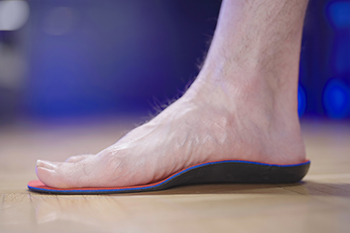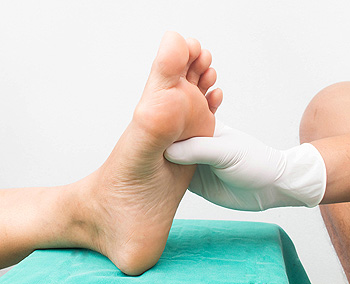Issaquah Podiatry Blog | Foot and Ankle Treatment Tips | Issaquah Foot & Ankle Specialists

Shockwave therapy treatments are administered outside the body and are non-invasive. A handheld transducer placed on the skin passes high-energy sound waves down into the injured tissue to increase blood flow. This activates the body’s natural healing process and reduces pain and inflammation. Shockwave therapy has provided fast results in treating heel pain, tendonitis, bursitis, and more with no needles or steroids.
Contact our office to learn more!

Swollen feet can serve as an indicator of underlying health issues, primarily stemming from fluid retention in body tissues. This phenomenon, known as edema, results from disruptions in the intricate processes of the circulatory system that can lead to the accumulation of excess fluid, resulting in swollen feet. Various factors contribute to edema, such as prolonged periods of standing that may impede blood flow, pregnancy-induced physiological changes, and varicose veins. In cases of congestive heart failure, the heart's inability to pump blood efficiently leads to blood stagnation, commonly causing edema in the lower limbs. Lymphedema, a consequence of a malfunctioning lymphatic system, can result from surgical procedures or genetic disorders, leading to fluid accumulation. Thyroid disorders, menstrual hormonal fluctuations, and liver damage, particularly cirrhosis caused by long-term alcohol exposure, are additional contributors to edema. Kidney disorders, such as nephrotic syndrome, can cause inefficient water removal and subsequent edema. For help with swollen feet or ankles, it is suggested that you schedule an appointment with a podiatrist for an exam and diagnosis.
Swollen feet can be a sign of an underlying condition. If you have any concerns, contact the podiatrists of Issaquah Foot & Ankle Specialists. Our doctors can provide the care you need to keep you pain-free and on your feet.
Swollen feet are a common ailment among pregnant women and people who stand or sit for extended periods. Aging may increase the possibility of swollen feet and patients who are obese often notice when their feet are swelling too. There may be medical reasons why swollen feet occur:
- Phlebitis - A condition that causes the veins to become inflamed and can also cause leg pain.
- Liver disease - This may lead to low blood levels of albumin which is a protein. This can cause fluid in the blood to pass into the tissues and several areas of the body can become swollen.
- Heart failure - When the heart doesn’t pump properly the blood that is normally pumped back to the heart can pool in the veins of the legs causing swollen feet.
- Kidney disease - One of the main functions of the kidneys is releasing excess fluid in the body. This type of condition can make it difficult for the kidneys to function properly, and as a result the feet may become swollen.
- Deep-vein thrombosis (DVT)- This is a serious condition where blood clots form in the veins of the legs. They can block the return of blood from the legs to the heart which may cause the feet to swell. It is important to be treated by a podiatrist if this condition is present.
Swollen feet can also be caused by bone and tendon conditions, including fractures, arthritis, and tendinitis. Additionally, there may be skin and toenail conditions and an infection may cause the feet to swell. Patients who take medicine to treat high blood pressure may be prone to getting swollen feet.
Many patients elevate their feet to help relieve the swelling and this is generally a temporary remedy. When a podiatrist is consulted the reason behind the swelling can be uncovered and subsequently treated.
If you have any questions please feel free to contact one of our offices located in Issaquah, WA . We offer the newest diagnostic tools and technology to treat your foot and ankle needs.

Custom-made orthotics are specialized devices designed to support and improve the function of the feet and lower limbs, offering a personalized solution for individuals with various lower limb problems. These devices are meticulously crafted based on an individual's unique foot structure and specific health needs, providing targeted support where it is most needed. They work by aligning the foot and ankle into their most anatomically efficient position, thereby alleviating stress and strain on the lower limbs. This tailored approach can significantly help in managing conditions such as flat feet, plantar fasciitis, bunions, and arthritis, as well as in alleviating discomfort caused by long periods of standing or walking. By improving foot mechanics, custom orthotics not only address immediate pain and discomfort but also aid in preventing future musculoskeletal issues. They are often recommended by podiatrists, as a key component in a comprehensive treatment plan for lower limb ailments. If you would like to learn how custom-made orthotics can help you, it is suggested that you make an appointment with a podiatrist today.
If you are experiencing discomfort in your feet and would like to try custom orthotics, contact the podiatrists from Issaquah Foot & Ankle Specialists. Our doctors can provide the care you need to keep you pain-free and on your feet.
What Are Custom Orthotics?
Custom orthotics are inserts you can place into your shoes to help with a variety of foot problems such as flat feet or foot pain. Orthotics provide relief and comfort for minor foot and heel pain.
Over-the-Counter Inserts
Shoe inserts come in a wide variety and are used to treat foot pain, heel pain, and minor problems. For example, arch supports can be inserted into your shoes to help correct overarched or flat feet, while gel insoles are often used because they provide comfort and relief from foot and heel pain by alleviating pressure.
Prescription Orthotics
If over-the-counter inserts don’t work for you or if you have a more severe foot concern, it is possible to have your podiatrist prescribe custom orthotics. These high-quality, custom inserts are designed to treat problems such as abnormal motion, plantar fasciitis, and severe forms of heel pain. They can even be used to help patients suffering from diabetes by treating foot ulcers and painful calluses and are usually molded to your feet individually, which allows them to provide full support and comfort.
If you're experiencing minor to severe foot or heel pain, it’s recommended to speak with your podiatrist about the possibility of using custom orthotics or shoe inserts. A podiatrist can determine which type of custom orthotic or shoe insert is right for you and help you take the first steps toward being pain-free.
If you have any questions please contact one of our offices located in Issaquah, WA . We offer the newest diagnostic and treatment technologies for all your foot and ankle needs.

Living with diabetes involves a comprehensive approach to health, with a particular focus on the well-being of your feet. Diabetes affects the blood supply, resulting in peripheral neuropathy and peripheral vascular disease. Both conditions heighten the risk of complications, such as ulcers, gangrene, and possible loss of limb. Warning signs include cold feet, numbness, sharp leg pain, or changes in foot color. Nail changes, corns, calluses, cracked, or dry skin warrant a podiatrist's assessment within one week. The extremities, like the feet, often reveal the first signs of diabetes-related symptoms. Regular check-ups with a podiatrist are essential for tests to gauge blood circulation and nerve function. Prevention is key to averting severe diabetic-related foot problems. Daily care for diabetics includes maintaining stable blood sugar levels, refraining from smoking, engaging in regular exercise, and avoiding barefoot walking. Ensure good foot hygiene by washing and drying the feet daily, and checking the feet for sores, cuts, or unexplained bruises. Wearing well-fitting shoes is also beneficial. Should you notice persistent issues affecting the feet, it is strongly suggested that you schedule an immediate appointment with a podiatrist.
Diabetic foot care is important in preventing foot ailments such as ulcers. If you are suffering from diabetes or have any other concerns about your feet, contact the podiatrists from Issaquah Foot & Ankle Specialists. Our doctors can provide the care you need to keep you pain-free and on your feet.
Diabetic Foot Care
Diabetes affects millions of people every year. The condition can damage blood vessels in many parts of the body, especially the feet. Because of this, taking care of your feet is essential if you have diabetes, and having a podiatrist help monitor your foot health is highly recommended.
The Importance of Caring for Your Feet
- Routinely inspect your feet for bruises or sores.
- Wear socks that fit your feet comfortably.
- Wear comfortable shoes that provide adequate support.
Patients with diabetes should have their doctor monitor their blood levels, as blood sugar levels play such a huge role in diabetic care. Monitoring these levels on a regular basis is highly advised.
It is always best to inform your healthcare professional of any concerns you may have regarding your feet, especially for diabetic patients. Early treatment and routine foot examinations are keys to maintaining proper health, especially because severe complications can arise if proper treatment is not applied.
If you have any questions please feel free to contact one of our offices located in Issaquah, WA . We offer the newest diagnostic and treatment technologies for all your foot and ankle needs.







